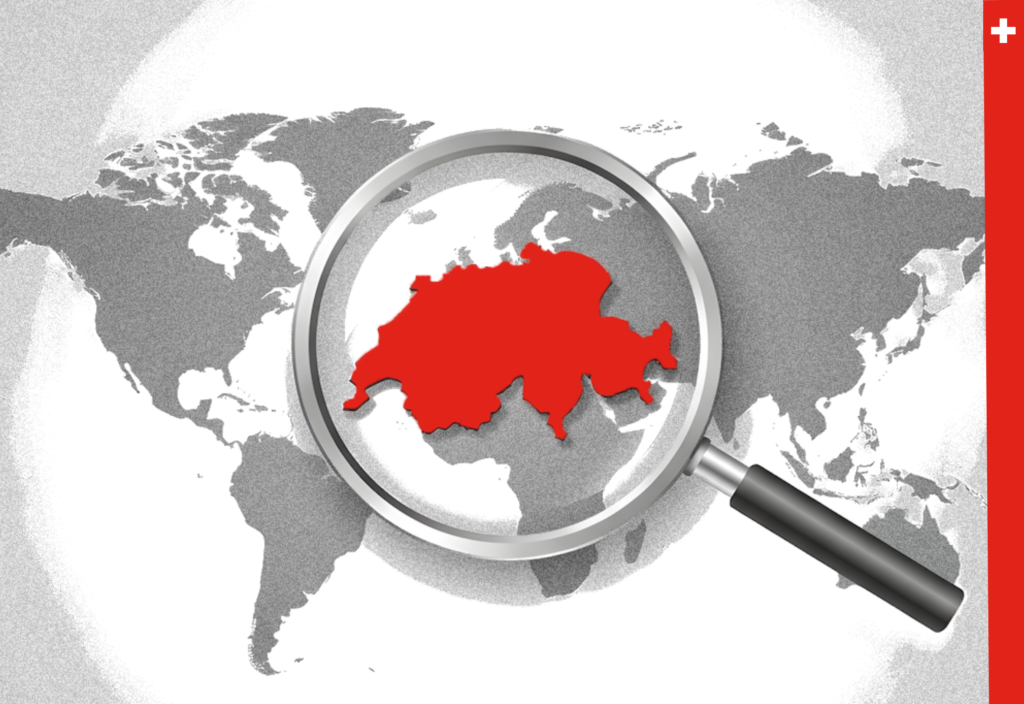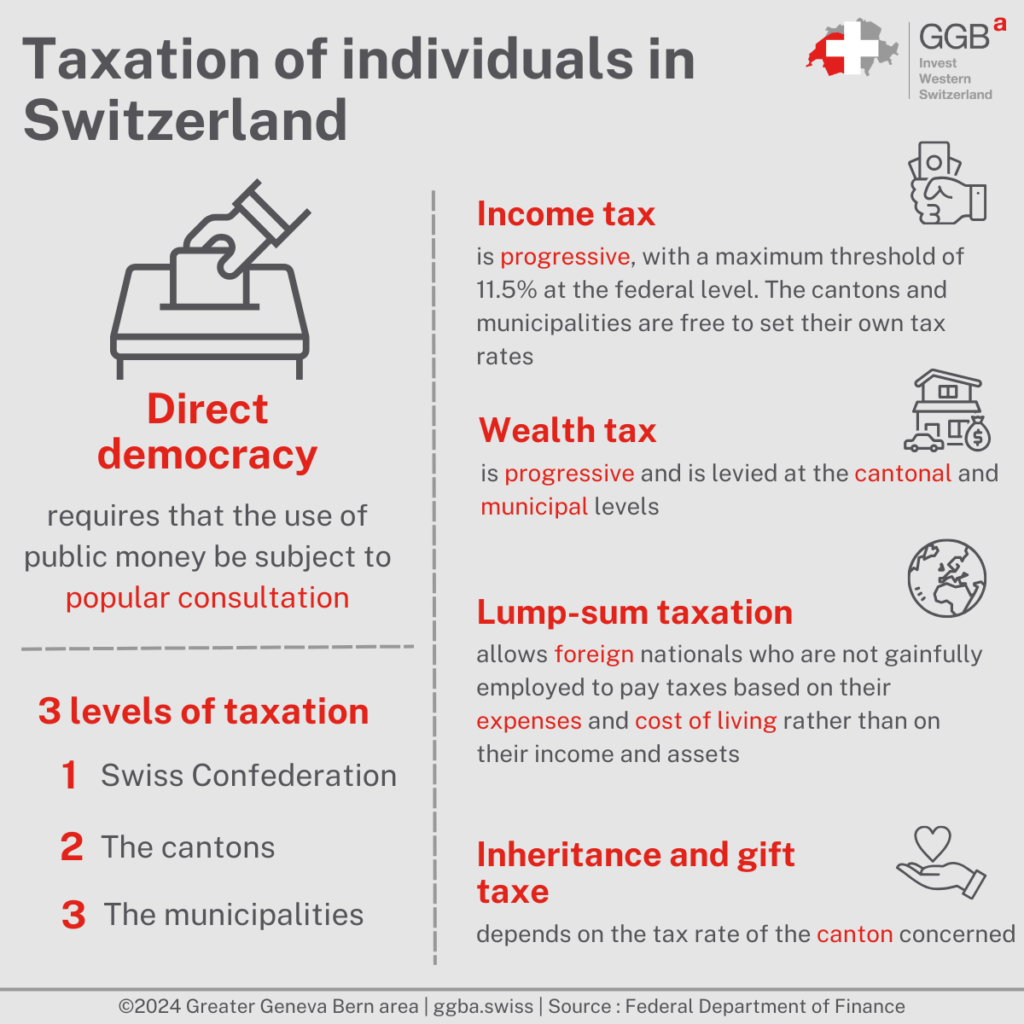
Taxation of individuals in Switzerland

The Swiss tax system is not only interesting for companies, but also for individuals. The tax burden on individuals is low by international standards. Here are the key points to know to understand the taxation of individuals in Switzerland.
Switzerland is a federal state since 1848. As a result, power is divided between the Confederation, the cantons, and the municipalities. The Swiss tax system reflects this federal structure as there are three levels of taxation: federal, cantonal, and municipal. The Swiss Confederation gives its cantons full right of taxation except those taxes that are exclusively reserved for the federal government. The cantons are therefore relatively independent in matters of taxation.
Income Tax
Persons subject to the law
Individuals subject to federal and cantonal/municipal income tax are those who are residents or staying in Switzerland. A person is considered to be resident in Switzerland if, without any significant interruption, he or she :
- Resides there for at least 30 days and is gainfully employed there;
- Resides there for at least 90 days without engaging in gainful employment.
Individuals who do not establish domicile or residence in Switzerland are subject to limited taxation if there is an economic relationship between them and certain tax objects located in Switzerland (e.g. real estate or production units).
Income tax is assessed based on a tax return sent to the taxpayer, which he or she must fill out himself or herself (this is called self-declaration). Income taxes are assessed and collected by the competent cantonal tax authorities.
Finally, it is important to note that partnerships (sole proprietorships, limited partnerships, and general partnerships) are treated as individuals for tax purposes, not as legal entities.
Taxable income
Although the tax is levied on all worldwide income, income from foreign activities, permanent establishments or real estate is exempt. They are then only taken into account for the determination of the applicable income tax rate.
Therefore, total revenue includes:
- Income from dependent or independent gainful activity;
- Income from movable and immovable assets;
- Income from the provident fund.
For married persons, the incomes of the spouses are added together according to the principle of family taxation. The sum of the two incomes determines the tax burden. This also applies to registered partners.
Several types of income are also exempt from income tax, but may, in certain circumstances, be subject to other taxes (e.g., gift tax or estate tax, mentioned later in this article).
Individuals can also deduct from their gross income the so-called acquisition costs, for example, business expenses such as travel costs or additional costs for eating out. In addition, contributions to social insurance, occupational pension plans, and personal pension plans are also deductible. Additional deductions can be obtained for dependent children, as well as for married couples. However, the number of deductions allowed can vary considerably from one canton to another.
The tax rate for individuals is progressive, with a maximum rate of 11.5% at the federal level. Cantons are free to set their tax rates, so we advise you to contact Greater Geneva Bern area for further information if you wish to set up business in Switzerland.
Withholding Tax
Foreign employees who are domiciled or resident in Switzerland but do not have a permanent residence permit are taxed on their income from gainful employment through a withholding tax. The tax due is deducted from the salary by the employer and paid directly to the tax authorities.
Employees who do not have a tax domicile in Switzerland are also subject to withholding tax, regardless of their nationality. In principle, a tax return cannot be filed. However, there is an exception for persons domiciled abroad but whose income is almost exclusively from Swiss sources or whose situation is comparable to that of taxable persons domiciled in Switzerland. Here too, no additional deduction is granted without application.
Wealth Tax
The net wealth tax is levied at the cantonal/communal level only. It is calculated following the regulations and tax rates of the canton concerned. It is progressive in most cantons, but each canton can set its tax rates.
This tax is based on the net assets, which include real and personal property such as:
- Titles;
- Bank holdings;
- Cash surrender value of life insurance;
- Vehicles;
- Interests in undivided estates;
- Etc.
Note that property that does not generate income is also taxed.
Shareholdings in foreign business enterprises or branches and real estate abroad are not subject to wealth tax. However, these assets are taken into account in determining the applicable capital tax rate, as long as this rate is progressive (progression reserve). Individuals can deduct their debts from their gross assets, as well as the various cantonal deductions, the value of which varies according to marital status and the number of children. In other words, the wealth tax concerns the net taxable wealth, i.e. the total assets minus the total established debts.
Expatriates
In Switzerland, expatriates are executives and certain specialists (e.g. in IT) who are temporarily seconded by their employer for a maximum period of five years. In other words, the secondment contract must have a fixed duration of five years maximum. They are granted tax deductions for the expenses incurred during their stay in Switzerland. In addition, they can also deduct the following expenses:
- Reasonable accommodation costs in Switzerland if the accommodation abroad is maintained for personal use (i.e. not rented during the secondment);
- The costs for the education of minor children by a private school, provided that the child’s place of residence is in Switzerland and the public schools do not offer education in the child’s language.
The right to expatriate tax status ceases as soon as the temporary assignment is replaced by permanent employment.
Taxation by expenditure
Federal tax laws and most cantonal laws provide for the possibility of benefiting from a special tax regime, taxation according to expenses, which allows foreign nationals residing in Switzerland but not exercising a lucrative activity to pay taxes calculated based on their expenses and the cost of living, rather than ordinary taxes on income and wealth. However, this taxation does not exist in all cantons.
Taxpayers who are not Swiss citizens and who reside or stay in Switzerland for the first time or after an absence of at least ten years without work are entitled to the lump-sum tax. The lump-sum tax provisions are intended for financially independent persons who are not looking for work in Switzerland.
When a married couple settles in Switzerland, the conditions to benefit from the taxation according to the expenses must be fulfilled by both spouses. It is not possible for one spouse to be taxed according to expenses and the other to be taxed according to the ordinary system.
Taxes are calculated based on the taxpayer’s annual domestic and international expenses. The calculation also includes the expenses of spouses and children in the taxpayer’s custody, as long as they reside in Switzerland. Expenses generally include food, clothing, housing, education, entertainment, and other living expenses. The exact calculation is determined in cooperation with the tax authorities of the canton in which the taxpayer intends to settle. In all cases, the minimum tax base is :
- At least seven times the taxpayer’s rent or the rent of a residence occupied and owned by the taxpayer;
- Three times the annual value of the pension if the taxpayer lives in a hotel or other similar establishment. If the taxpayer rents or owns several properties, the highest rent or rental value is used.
In general, taxpayers benefiting from the lump-sum taxation are considered Swiss residents and can, as such, benefit from tax relief on their foreign-source income, following the agreements in force. However, some treaties make it a condition of eligibility for tax relief that all income from the home country is subject to ordinary taxation in Switzerland.
Inheritance and gift tax
Inheritance and gift taxes have not been harmonized. As a result, the levying of these taxes is left to the discretion of the cantons and cantonal regulations differ in many respects. With a few exceptions, all cantons levy an inheritance and gift tax for certain transfers if the deceased or the donor resides in the canton or for real estate located in the canton.
The tax rates for inheritance and gifts are mostly progressive and are generally based on the relationship between the deceased or donor and the beneficiary and/or the amount received by the beneficiary. In all cantons, spouses are exempt from estate and gift taxes. Direct descendants are also exempt in most cantons.

In a nutshell: the Swiss tax system reflects the federal structure of the country. Each canton has its particularities in terms of taxation. Generally speaking, Switzerland has an attractive tax system for individuals, since they benefit from a moderate tax burden in comparison with other countries.
Greater Geneva Bern area (GGBa) is the investment promotion agency for Western Switzerland. If you would like to know more about personal income tax or other subjects that could help you in your implantation, contact us.
Our articles “Why Switzerland” are likely to answer the questions you have.

